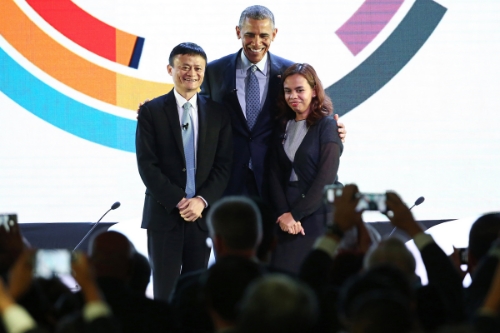U.S. President Barack Obama (center), poses for a photograph with Alibaba billionaire Jack Ma and Aisa Mijeno, an engineer and social worker, at the APEC CEO Summit in Manila on Nov. 18, 2015. Photographer: Seong Joon Cho/Bloomberg
Until this week, Aisa Mijeno was yet another entrepreneur struggling to raise money for her startup in the Philippines. Then she got a call from the White House.
Now the 31-year-old engineer is getting global attention after President Barack Obama offered to play matchmaker for her company, which builds lamps that run on seawater. Mijeno, the co-founder of SALt, shared a stage Wednesday with Obama and Alibaba Group Holding Ltd.’s Jack Ma at the Asia-Pacific Economic Cooperation summit in Manila.
In a televised discussion about climate change before business and political leaders, the environmentalist pitched her marquee product: a lamp working off seawater, or a mixture of tap water and salt, to help people on the Philippines’ 7,000 islands who have difficulty accessing kerosene or who depend on candles.
“We also need a lot of support in terms of funding,” she said. “That’s our main challenge right now.”
To which Obama replied: “I’m serving as a matchmaker here.” The audience cheered.
Washington Call
Mijeno’s whirlwind started when she got a call from the White House asking her to join a panel that Obama would moderate. She thought it was a prank call. It turns out the U.S. president wanted to speak with the head of a startup, and his staff found her online, Mijeno said in an interview.
She was so excited she slept only three hours and almost fainted onstage during the conversation with Obama and China’s second-richest man.
Mijeno developed her idea for SALt, an acronym for Sustainable Alternative Lighting, after trekking in the mountains of Kalinga in the northern Philippines, where she saw people walk six hours every other day to buy lamp fuel. That’s when the electrochemist hit upon the idea of lighting that works off a resource covering 70 percent of the planet -- water.
Read the full story here.
News Story from Bloomberg Business

